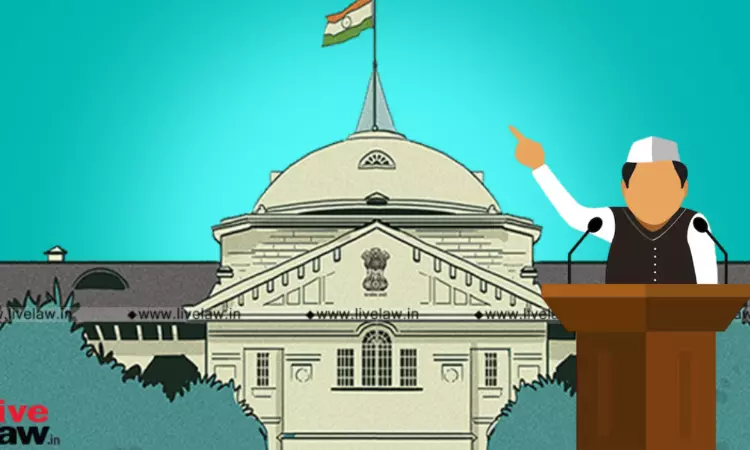- Home
- /
- High Courts
- /
- Allahabad High Court
- /
- Persons With Criminal Background...
Persons With Criminal Background Pollute Election Process; If Elected, They Pose A Serious Threat To Democratic System: Allahabad HC
Sparsh Upadhyay
28 April 2024 12:47 PM GMT
While granting bail to former MP Dhananjay Singh in connection with a kidnapping and extortion case (of a Namami Gange project manager), the Allahabad High Court took a strong stance on the issue of candidates with criminal backgrounds participating in elections. In its 35-page order refusing to stay his conviction, Justice Sanjay Kumar Singh also highlighted the dangers posed...
While granting bail to former MP Dhananjay Singh in connection with a kidnapping and extortion case (of a Namami Gange project manager), the Allahabad High Court took a strong stance on the issue of candidates with criminal backgrounds participating in elections.
In its 35-page order refusing to stay his conviction, Justice Sanjay Kumar Singh also highlighted the dangers posed by individuals with criminal records to the electoral process.
“Persons with criminal background pollute the process of election as they have no reservation from indulging in criminality to win an election. When persons having long criminal history turn into elected representatives and become law maker, they pose a serious threat to the functioning of a democratic system,” the Court remarked.
Importantly, the Court noted that the rising trend of criminals entering politics severely threatens democracy, undermining its foundations.
“The very future of our democracy gets imperilled when such offenders masquerade as leaders making a travesty of the entire system. The increasing trend of criminalisation of politics is dangerous and has steadily been eating into the vitals of our democratic polity along with growing corruption of a humongous nature,” the single judge remarked.
Reiterating the need for purity in politics, the Court added that Courts should exercise their discretionary power sparingly and cautiously in rare and appropriate cases to stay judgments of conviction.
“It is often seen that after conviction of a person who was or is Member of Legislative Assembly or Member of Parliament, used to take a general plea for stay of operation and effect of his conviction that he wants to contest election and in case the judgment of his conviction is not stayed, he will be deprived of his right to contest the election which will result in irreparable loss and injury to him, but this Court feels that each and every case has to be decided on its own merit as well as considering all the surrounding circumstances and other attending factors including gravity of offences, nature of previous criminal history etc,” the Court said.
Against this backdrop and considering the fact that Singh has secured orders of acquittal in 28 criminal cases due to reasons that witnesses turned hostile as pointed out on behalf of the State, which he had not controverted and that there is no dispute that at present, 10 criminal are still pending against him, the Court did not find any good ground to stay the operation and effect of the impugned judgment of conviction passed by the MP/MLA Court.
The case against Singh had been lodged by Muzaffarnagar resident, Abhinav Singhal, alleging therein that he was abducted by Singh and his associate and was taken to Singh's residence wherein the Ex-MP came with a pistol and abused him and pressurised him to supply low-quality material for the Namami Gangey Project Scheme.
Singh argued before the High Court that the police had falsely implicated him for political reasons and fabricated a false case against him.
His Counsel also contended that he had been a Member of the Uttar Pradesh Legislative Assembly twice and a Member of Parliament once. Now, he wants to contest the elections for Member of Parliament in 2024.
In view of this, he prayed that his conviction be suspended so that he could contest the Lok Sabha polls; otherwise, his loss cannot be compensated in case of an irreversible acquittal in the future.
Against this backdrop, taking note of the facts of the case and the fact that the chain of the prosecution case is missing, the Court observed that the accused-appellants are entitled to the benefit of the doubt for the purposes of granting bail and suspending sentence. The Court, however, refused to suspend his conviction.
Case title - Dhananjay Singh and another vs. State of UP 2024 LiveLaw (AB) 268
Citation: 2024 LiveLaw (AB) 268


